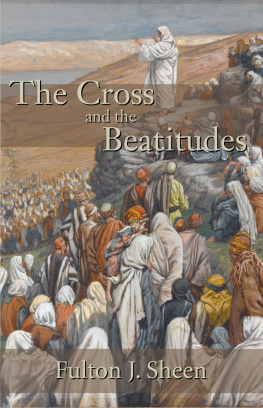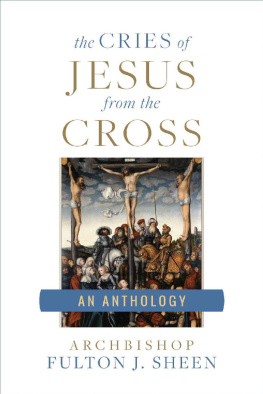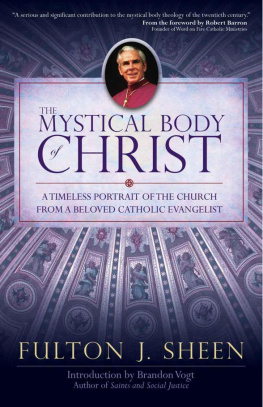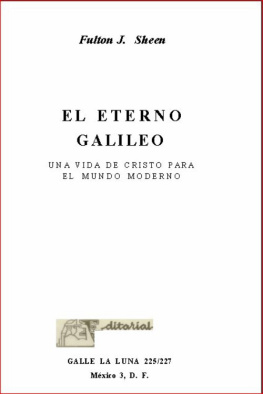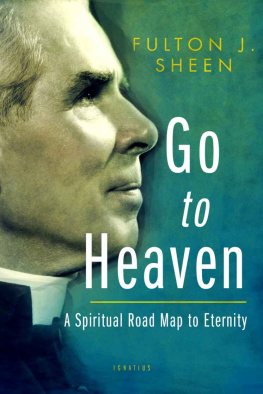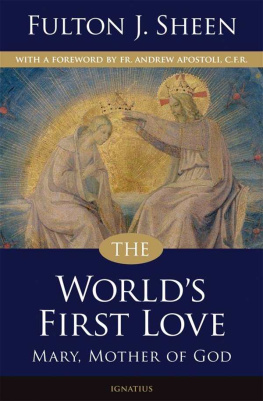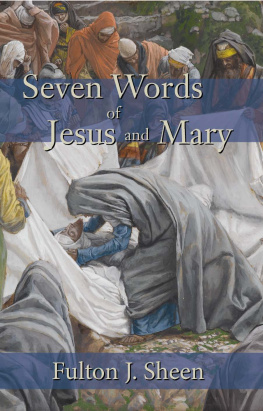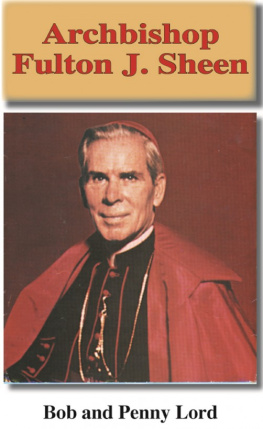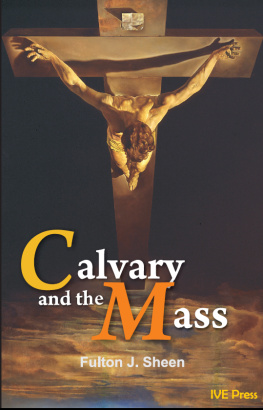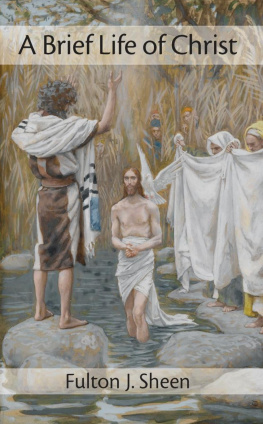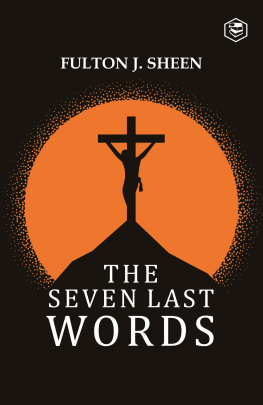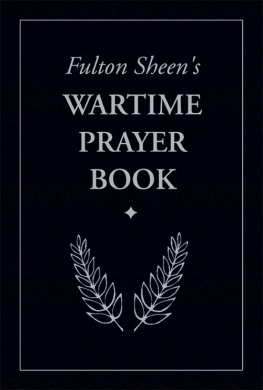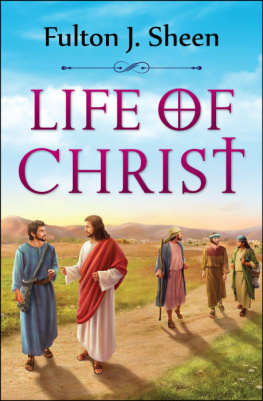THE CROSS
AND THE BEATITUDES
Angelico Press reprint edition, 2012
This Angelico edition is a slightly altered republication of the work originally published by P. J. Kenedy & Sons, New York, in 1937.
No part of this book may be reproduced or transmitted, in any form or by any means, without permission.
For information, address:
Angelico Press
4619 Slayden Rd. NE
Tacoma, WA 98422
angelicopress.com
978-1-887593-08-3
Cover Design: Cristy Deming
Image Credit: James Tissot (French, 18361902).
The Sermon of the Beatitudes
Brooklyn Museum, Purchased by
public subscription, 00.159.124
Dedicated
to
OUR HEAVENLY MOTHER
who
Through the Cross
Leads us to Beatitude
CONTENTS
INTRODUCTION
THIS little book is a correlation of the Seven Beatitudes and the Seven Last Words. The eighth beatitude, in the language of Saint Thomas Aquinas, is a confirmation and a declaration of all those that precede. Because from the very fact that a man is confirmed in poverty of spirit, meekness, and the rest, it follows that no persecution will induce him to renounce them. Hence the eighth beatitude corresponds in a way to all the preceding seven.
There is no strict correspondence between the Seven Beatitudes and the Seven Words, but this work assumes they are not unrelated, for one seems to be related to the other as precept and deed. Both were delivered on a mountain; Our Lord began his public life on the Mount of the Beatitudes and closed it on the Mount of Calvary. The story of how he practiced the meekness, the mercy, and the poverty of the Beatitudes is here told. If it brings just one soul closer to Our Lord and his Blessed Mother it will have been eminently worthwhile.
Fulton J. Sheen
The First Word
The First Word
Blessed are the meek: for they shall possess the land.
Father, forgive them, for they know not what they do.
OUR Blessed Lord began his public life on the Mount of the Beatitudes, by preaching: Blessed are the meek: for they shall possess the land. He finished his public life on the Hill of Calvary by practicing that meekness: Father, forgive them, for they know not what they do.
How different this is from the beatitude of the world! The world blesses not the meek, but the vindictive; it praises not the one who turns the other cheek, but the one who renders evil for evil; it exalts not the humble, but the aggressive. Ideological forces have carried that spirit of violence, class-struggle, and the clenched fist to an extreme the like of which the world before has never seen.
To correct such a warlike attitude of the clenched fist, Our Lord both preached and practiced meekness. He preached it in those memorable words which continue the Beatitudes:
You have heard that it has been said: An eye for an eye, and a tooth for a tooth. But I say to you not to resist evil: but if one strikes you on your right cheek, turn to him also the other: and if a man will contend with you in judgment, and take away your coat, let go your cloak also unto him. And whosoever shall force you one mile, go with him two.... You have heard that it has been said: You shall love your neighbor, and hate your enemy. But I say to you: Love your enemies: do good to them that hate you: and pray for them that persecute and calumniate you that you may be the children of your Father who is in heaven, who makes His sun to rise upon the good and bad, and rains upon the just and the unjust. For if you love them that love you, what reward shall you have? Do not even the publicans do this? And if you salute your brethren only, what do you more? Do not also the heathens this? Be you therefore perfect, as also your heavenly Father is perfect.
But he not only preached meekness; he practiced it. When his own people picked up stones to throw at him, he threw none back in return; when his fellow townsmen brought him to the brow of the hill to cast him over the precipice, he walked through their midst unharmed; when the soldier struck him with a mailed fist, and made the Savior feel by anticipation the clenched fist of Communism, he answered meekly: If I have spoken evil, give testimony of the evil: but if well, why do you strike me?
When they swore to kill him, he did not use his power to strike dead even a single enemy; and now on the Cross, meekness reaches its peak, when to those who dig into the hands that feed the world, and to those who pierce the feet which shepherd souls, he pleads: Father, forgive them, for they know not what they do.
Which is rightthe violence of Communism and other systems of persecution or the meekness of Christ? Such violence says meekness is weakness. But that is because it does not understand the meaning of Christian meekness. Meekness is not cowardice; meekness is not an easy-going temperament, sluggish and hard to arouse; meekness is not a spineless passivity which allows everyone to walk over us. No! Meekness is self-possession. That is why the reward of meekness is possession.
A weak man can never be meek, because he is never self-possessed; meekness is the virtue that controls the combative, violent, and pugnacious powers of our nature, and is therefore the best and noblest road to self-realization.
The meek man is not a man who refuses to fight, nor is he a man who will never become angry. A meek man is someone who will never do one thing: he will never fight when his conceit is attacked, but only when a principle is at stake. And there is the keynote to the difference of the anger of the violent man and the anger of the meek man.
Violence begins at the moment conceit is attacked; fists clench and rise as soon as the ego is challenged; cheeks flush as soon as self-love is wounded, and blood boils and flows at that split second when pride is humbled.
The anger of the Communist or violent man is based on selfishness; he hates the rich not because he loves the poor in spirit, but because he wants to be rich himself. He is really a capitalist without any cash in his pockets. Selfishness is the worlds greatest sin; that is why the world hates those who hate it, why it is jealous of those who have more; why it is envious of those who do more; why it dislikes those who refuse to flatter, and why it scorns those who tell us the truth about ourselves; its whole life is inspired by the egotistical, and the personal, and its wrath is born of that self-love.
Now consider the anger of the meek man. For the meek man, not selfishness but righteousness is his guiding principle. He is so possessed, he never allows his fists to go up for an unholy purpose, or in defense of his pride or vanity, or conceit, or because he wants the wealth of another. Only the principles of Gods righteousness arouse a meek man. Moses was a meek man, but he broke the tablets of stone when he found his people were disobeying God.
Our Lord is Meekness Itself, and yet he drove the buyers and sellers from the Temple when they prostituted his Fathers House; but when he came to the doves, he was so self-possessed he gently released them from the cages. He is so much master of himself, that he is angry only when holiness is attacked, but never when his Person is attacked. That is why when the Gerasenes beseeched Our Lord to leave their coasts, without a single retort, entering into a boat, He passed over the water and came into His own city.
That is why when men laughed him to scorn he said nothing but approached the dead daughter of Jairus, and went on with his work of mercy oblivious to their insults, and restored her to life. That is why he addressed Judas as Friend when he blistered his lips with a kiss. That is why Our Lord from the Cross prays for the forgiveness of his enemies. Their wrath directed against his Body he would not return, though he might have smitten them all dead by the power of his Divinity. Rather, he forgave them, for they know not what they do.

